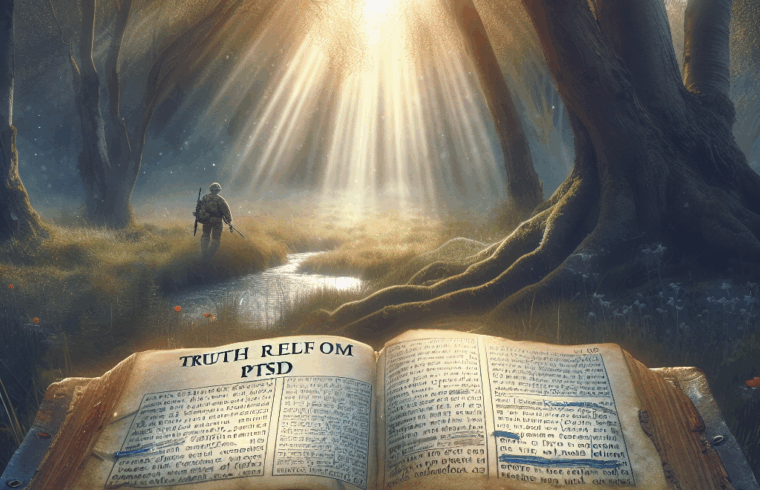==> Thank you for reading this post! Click Here If you are looking for support and Victory over PTSD.
Finding Peace in God’s Presence
Understanding Divine Embrace
When we’re tangled up in the struggle of PTSD, it can feel like peace is just out of reach. But I’ve learned that God’s presence is one of the most comforting places to find solace. It’s like wrapping yourself in a warm blanket on a cold day—there’s a snug safety there.
In the Bible, God invites us to come as we are, with all our scars. Psalms often remind me of this, especially verses that highlight His comforts and protection. I can just picture Him saying, “Hey, I’ve got you.” Recognizing that I’m not alone in my feelings helps me lean into that divine embrace more deeply.
Even finding a quiet space to pray can shift my mindset. Instead of the chaos swirling in my head, I focus on a simple truth: God cares and is right there, waiting to hold my burdens. That connection? It’s my lifeline.
Prayer as a Healing Tool
Prayer can seem intimidating, especially when you feel like your mind is racing. But honestly, it doesn’t have to be fancy or scripted. For me, it’s often just a heartfelt conversation with God. I share what’s weighing me down, my fears, and even my anger.
Some days, my prayers might be short and to the point; other days, I might ramble on about anything and everything. The beautiful part is, it doesn’t matter how I pray—it’s about being honest and showing up. In return, I feel His peace washing over me.
Plus, I’ve found that journaling my prayers can provide a different angle. Looking back on those entries often shows me how far I’ve come, and it reminds me that I’m not taking this journey alone.
Scripture as a Source of Strength
When life gets overwhelming, I lean into scripture. There are passages that resonate in a profound way—words that seem to speak directly to my soul. I keep some of these verses close, whether I write them down or memorize them.
For instance, when I’m engulfed in anxiety, I often recite Philippians 4:6-7, which talks about presenting our worries to God and receiving His peace. It’s like a gentle reminder that I don’t have to carry my burdens alone.
Reading Scripture helps me shift my focus. Instead of dwelling on the trauma, I am reminded of God’s promises. And with each reading, I feel a bit stronger, a bit more anchored in hope.
Embracing Community Support
The Power of Sharing
I can’t stress enough how transformative it’s been for me to share my feelings with others. It can be a bit scary at first, stepping out of my comfort zone and being vulnerable, but it’s worth it. What I’ve found is a community of beautiful souls who understand and care.
Talking openly about our experiences, whether it’s with a friend, family member, or a support group, lessens the weight of isolation that PTSD often brings. When you share your truth, it suddenly feels lighter, and the burden becomes bearable.
Also, there’s something healing about hearing others’ stories. It fosters connection and reassures us that we’re not alone in this journey. We all carry our battles, and together, we can navigate through them much better.
Seeking Professional Help
As much as sharing with friends is vital, I realized that sometimes I need professional help. Therapists or counselors who specialize in PTSD can provide tools and strategies that friends can’t. They can see things from a fresh perspective and help you untangle the complexities of your feelings.
If you’re on the fence about seeking help, I get it! I hesitated too. But once I took that step, I understood just how much guidance and clarity a professional could offer. It’s like having a personal coach to help you through some of life’s hardest games.
It’s important to find someone you feel comfortable with. Don’t hesitate to shop around for therapists or groups until you find a fit. It’s so worth it when you finally find that synergy.
Building Healthy Relationships
Surrounding myself with supportive people is crucial. The relationships I cultivate have a tremendous impact on my healing journey. I’ve learned to discern who truly brings positivity into my life and who doesn’t.
Healthy relationships are built on trust, understanding, and empathy. When I’m feeling low, having those people around can uplift my spirits. Sometimes a simple text or a phone call can remind me of my worth and help ground me.
Equally, it’s essential for me to be a supportive friend as well. Sharing compassion and understanding can foster a beautiful cycle of support. When we help each other out, we all heal a bit quicker.
Practicing Self-Care
Creating a Routine
Let’s be real—life can get chaotic. That’s why I’ve found creating a daily routine to be a game-changer. When my days have structure, I feel more grounded. It doesn’t mean everything has to be scheduled down to the last minute, but having key rituals—like morning coffee or evening gratitude reflection—sets the tone for my day.
Feeling organized helps ease the anxiety that comes with unpredictability. And over time, I’ve noticed how little habits, like taking a walk or reading, add joy to my life. They become checkpoints of self-care that reinforce my commitment to myself.
While routines are great, I also make room for flexibility. If something disrupts my schedule, I remind myself it’s okay to adjust. Being too rigid can backfire and create more stress, so striking that balance is key.
Get Support and Help with Recovery! Visit us for more Information and Support
Mindfulness Practices
Mindfulness has introduced me to a new way of looking at my thoughts and emotions, especially during hard times. Instead of trying to suppress what I’m feeling, I’ve learned to observe those feelings without judgment. It’s a liberating experience!
Simple practices like deep breathing or guided meditation can anchor me, bringing peace and clarity amidst the turmoil. I make it a point to set aside time for meditation, even if just for a few minutes a day. Trust me; it makes a difference!
Additionally, mindfulness helps ground me when I’m feeling overwhelmed. It encourages me to focus on the present rather than getting lost in anxiety about the future or regret about the past. It’s all about finding that sweet spot of acceptance.
Nourishing My Body
Eating well is a big piece of the self-care puzzle. I’ve discovered that fueling my body with nutritious foods makes a noticeable difference in how I feel mentally and emotionally. It’s like giving my mind the best tools to fight against the storms of PTSD.
Being mindful of what I eat doesn’t mean I’m all about salads; it’s about balance. I allow myself the comfort foods too, making it a point to enjoy them in moderation. Allowing some indulgence while ensuring I eat plenty of fruits, veggies, and whole grains is the way to go.
Don’t forget hydration! Sometimes, I overlook how much a simple thing like drinking enough water can keep my energy levels up. So, I’ve made it a habit to carry around a water bottle as a little reminder to keep that hydration flowing.
Finding Hope and Purpose
Setting Goals
For me, setting realistic goals has been crucial in my healing journey. It gives me something to strive towards and keeps me motivated. Those goals, big or small, help me feel a sense of purpose and accomplishment.
I start by breaking down larger goals into manageable steps. Whether it’s learning a new skill or just getting through the day without feeling overwhelmed, those baby steps really count! Each thing I check off reminds me that I’m moving forward.
And let’s not forget the importance of celebrating those achievements! Even if it seems small, acknowledging progress boosts my morale and reinforces that journey of healing.
Finding Meaning in Life
To find hope and purpose, I often reflect on ways to serve others. Whether volunteering or just lending an ear to a friend, it reminds me that even in tough times, I have something valuable to give. Helping others can ignite a spark within us that we might not even realize was dimmed.
Engaging in activities that bring me joy—like art, music, or nature—also allows me to touch on those deeper meanings of life. Often, it’s in these meaningful moments that I reconnect with the joy that resides in my heart.
I’ve found that keeping a gratitude journal helps me to identify the blessings in my life, even amidst the challenges. It reinforces that there’s always something to be grateful for, and that alone pushes me to see the brighter side of life.
Trusting in God’s Plan
And let’s be real—trusting in God is the heart of it all. I might not always understand why certain things happen, but I hold onto the belief that I’m not alone in this fight. Knowing that God has a bigger plan for me brings a comforting reassurance, especially in the darkest moments.
In moments of doubt, I revisit my favorite scriptures that remind me of His unwavering support. It helps me to remember that just like any good father, He desires the best for me, even if it’s cloaked in hardship.
Letting go of that constant need for control is huge. It’s challenging, but by placing my trust in Him, I find solace and strength in knowing that everything will unfold in its time, and I’ll be okay.
FAQs
1. What is PTSD and how can God’s Word help?
PTSD stands for Post-Traumatic Stress Disorder, a condition that may occur after experiencing or witnessing a traumatic event. God’s Word can provide comfort, hope, and guidance through scripture and prayer, helping to ease anxiety and promote healing.
2. How can I find peace in God’s presence?
Finding peace in God’s presence involves creating quiet moments for prayer and reflection. This can be done by reading scripture, praying, and being open to His embrace, knowing He is there to support you through your struggles.
3. Why is community support important for healing from PTSD?
Community support is essential because it reduces feelings of isolation and fosters connections with those who understand your experiences. Sharing your story with others can be incredibly relieving and help validate your feelings.
4. What role does self-care play in managing PTSD?
Self-care is crucial in managing PTSD as it helps to strengthen your mental and emotional well-being. Establishing routines, practicing mindfulness, and nourishing your body can enhance your overall quality of life and provide stability during difficult times.
5. How can I trust in God’s plan when things seem hopeless?
Trusting in God’s plan is about surrendering your worries and believing that everything happens for a reason. Regularly engaging with scripture, praying, and focusing on gratitude can help reinstate faith and remind you that you’re not alone in your journey.













